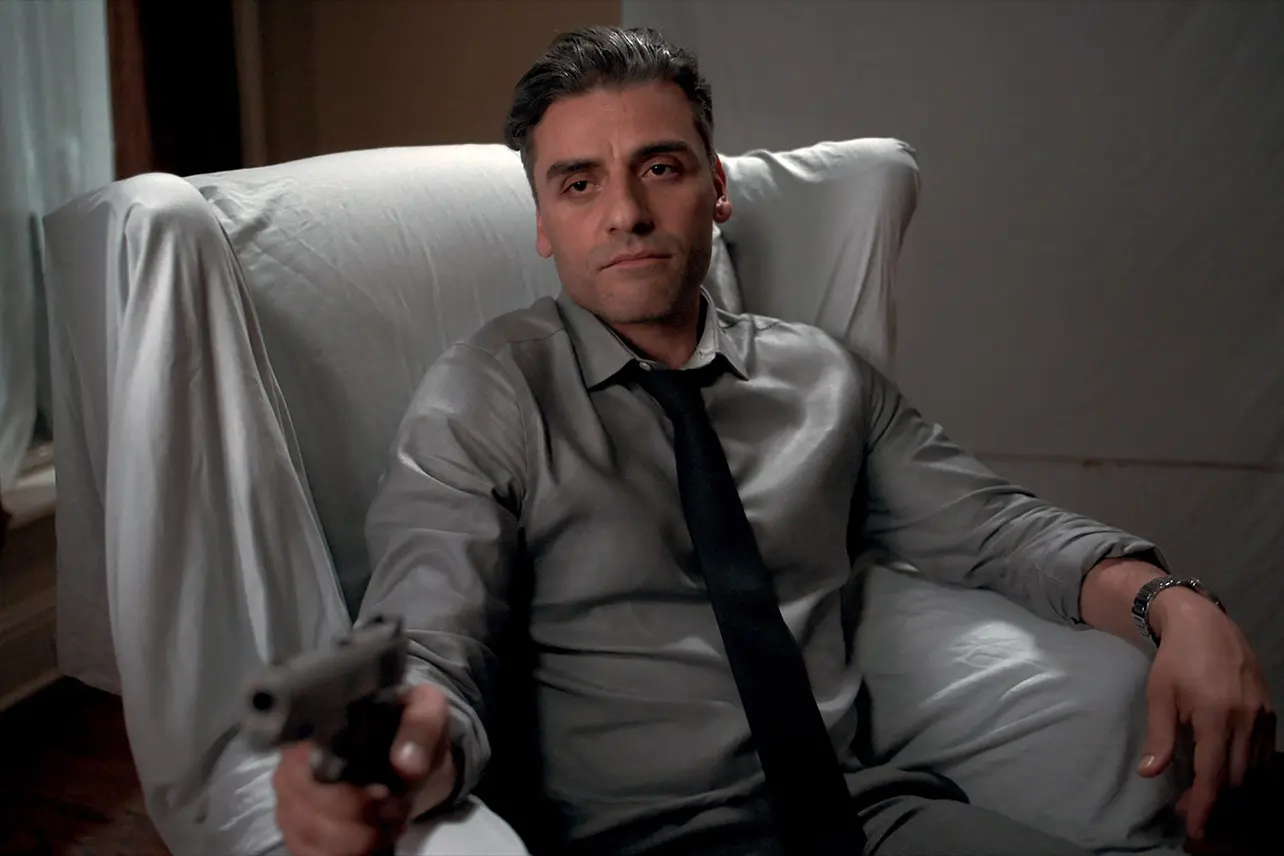Paul Schrader’s ‘The Card Counter’ is an enthralling tale that digs deep into a man’s moral responsibility.
The film follows an ex-convict who learns to play cards in prison. After serving his time, he uses his newly acquired skill to earn money while living a low-profile life.
However, an encounter with a former colleague’s son eventually brings him out of the shadows and forces him to seek bloody revenge.
If you are up for a gripping story of vengeance, then you’re in luck. Here is everything that happened in ‘The Card Counter.’
‘The Card Counter’ Synopsis and Ending Explained
William Tell (Oscar Isaac) learned to play cards while serving eight years in an American military prison.
After getting released, he makes ends meet by becoming a low-profile poker player. Despite his impressive gambling skills, he bets small and wins small to avoid unnecessary attention. William manages to stay off the radar while visiting a lot of casinos in the U.S.
The former prisoner lived stealthily until he unexpectedly met La Linda (Tiffany Haddish), a past associate.
Linda works as a mid-man between gamblers and investors, who supports gamblers financially in return for a portion of their wins.
Impressed with his skills, Linda offered William to hook him with an investor. However, William thinks working with an investor is a trap. It will only burden and put pressure on him as a player, so he politely refused.
William comes across a seminar in Atlantic City, whose spokesman was Major John Gardo (William Dafoe).
He decides to leave almost immediately, but a teenage boy, Cirk (Tye Sheridan) slips him a note.
Cirk gave William his number with an instruction to contact him. Curious, William decides to meet up with the young boy.
William finds out that Cirk wants to kill Major John Gardo. The boy is fuming with hatred, but William talks the boy out of it to save him from committing a crime he will regret.
Who Is Major John Gordo? Why Cirk Wants To Kill Him?
Major John Gordo, whose real name is John Rogers, was born in Georgia. He was a private contractor best known for his skills and abilities in interrogation.
Gordo entered the Survival Evasion Resistance Escape (SERE) program after training in Nicaragua as an interrogator.
The program aims to help U.S soldiers withstand extremely hostile interrogations if they get captured by enemies.
However, after the foreign soldiers at the Guantanamo imprisonment camp refused to talk during interrogations, they decided to enhance the SERE tactics.
John Gordo is among the consultants who arrived at the Gitmo camp to revise the interrogation methods.
These methods are inhumane and can easily break anyone in all aspects, but they were effective.
Soon, the enhanced method gets carried out to interrogation sites all over the world.
In 2003, the U.S government applied the techniques for their civilian prisons at a jail in Iraq, Abu Ghraib.
Cirk’s father, Roger Baufort and William met Major John Gordo in the prison of Iraq, Abu Ghraib. Gordo taught them the art of interrogation.
Why did Cirk want to take vengeance on Major John Gordo?
As mentioned, the interrogation was harsh, inhumane, and illegal. When photos of the brutal interrogation leaked, Gordo disappeared without a trace.
All the people in the photos, including William and Cirk’s father, get imprisoned. However, John Gordo, their supervisor, went unpunished and even built his own consultancy company.
Because of a flaw in the legal system, Gordo becomes immune to the crimes and cannot get persecuted.
Roger Beaufort lost his mind because of the incident. After getting released from prison, Robert physically abused his wife and son, Cirk. He also got addicted to Oxycodone and eventually committed suicide.
William manages to preserve his sanity and continues to live a quiet life as a poker player.
Cirk blamed Gordo for the physical abuse caused by his father.
He cannot bear the thought that soldiers like his father paid for the crime, while the mastermind, Gordo remains free as a bird.
Cirk wants to kill Gordo for revenge.
“The Card Counter Ending Explained: Did Cirk Get His Revenge?”
William persuaded Cirk to give up his revenge against Gordo. However, the boy would not budge.
William asks Cirk to go with him to the casinos, hoping to keep him away from a violent life. He even decides to participate in the World Series of Poker tour to win enough money to pay off Cirk’s debt and give him a new life.
He plans to play for a year and then return to living anonymously.
After a few matches, William managed to raise $150,000. He convinced Cirk to take the money and start a new life with his mom. But vengeance weighs more on Cirk’s heart.
During one of his matches, William receives a message saying that Cirk did not go to his mom. Instead, he went to Gordo’s house to take his revenge.
William walks off the casino floor. He discovers in a news report that a suspect armed with a pellet gun shoots Gordo but misses. Gordo returned fire and killed the suspect. William automatically knew that it was Cirk.
Enraged, William visits Gordo to avenge Cirk’s death. William reminds Gordo of his crimes and subsequently kills him in a dramatic reenactment of the violent interrogations.
William returns to the same prison after killing Gordo.
“I never imagined myself as someone suited to a life of incarceration,” William says.
In the end, Cirk gets his revenge, but it cost his life and William’s freedom.
The film ends with Linda visiting William at the prison.
‘The Card Counter’ bears striking resemblance to Paul Schrader’s 1976 masterpiece, ‘The Taxi.’ Both films follow ex-military soldiers who lived low-profile lives. The lead characters experienced warfare trauma, that continues to haunt them in the present day. Although the films ended on a completely different note, they both convey the negative effects of war on men.

